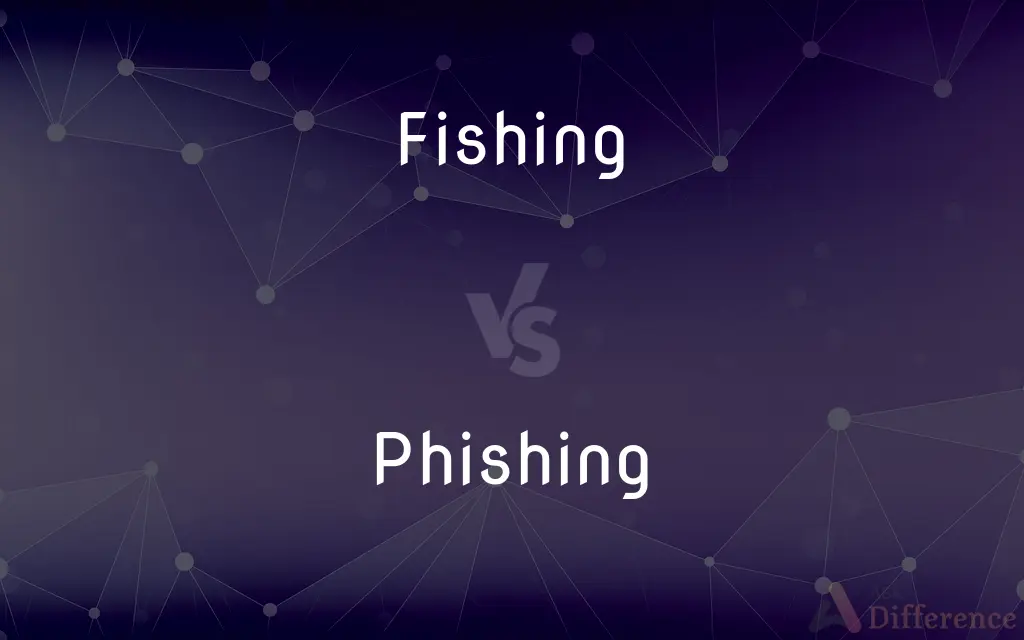Fishing vs. Phishing — What's the Difference?
By Tayyaba Rehman & Urooj Arif — Updated on April 3, 2024
Fishing involves catching fish from water bodies, while phishing is a cybercrime technique that tricks individuals into revealing personal information.

Difference Between Fishing and Phishing
Table of Contents
ADVERTISEMENT
Key Differences
Fishing and phishing sound identical but represent entirely different activities. Fishing is a physical activity or hobby involving the catching of fish from oceans, rivers, lakes, or other water bodies. It can be for recreational, commercial, or subsistence purposes, using various techniques like rod and line, nets, or traps. Phishing, however, is a deceptive practice within the realm of cybersecurity. It's a form of fraud where attackers pose as trustworthy entities in communications, such as emails or messages, to lure individuals into providing sensitive data like passwords, credit card numbers, and personal information.
While fishing is an age-old practice that connects people with nature and can serve as a source of food, sport, or relaxation, phishing is a modern-day crime that exploits human trust to gain unauthorized access to personal or financial information. The motivations behind each are vastly different: one seeks to harvest the natural resources of the water, and the other aims to exploit the vulnerabilities in information security systems and human psychology.
The techniques used in both fishing and phishing also differ significantly. In fishing, knowledge of fish behavior, habitat, and the environment plays a crucial role in the success of the activity. Phishing, on the other hand, relies on social engineering techniques and the manipulation of digital communications to deceive recipients into believing that the request for information is legitimate.
The impact of fishing and phishing diverges as well. Sustainable fishing practices can contribute to the balance of aquatic ecosystems and support livelihoods, whereas irresponsible fishing can lead to environmental degradation. Phishing, inherently malicious, poses significant risks to individual privacy, financial security, and the integrity of information systems, leading to financial losses and identity theft.
Understanding the difference between fishing and phishing is important not only for clarity in communication but also for recognizing the distinct challenges and implications associated with each term.
ADVERTISEMENT
Comparison Chart
Definition
The activity of catching fish.
A cybercrime technique for stealing personal information.
Purpose
Recreational, commercial, or subsistence.
To trick individuals into revealing sensitive data.
Techniques
Rod and line, nets, traps.
Social engineering, deceptive emails/messages.
Motivation
Food, sport, connection with nature.
Exploitation of human trust for unauthorized access.
Impact
Can be sustainable or lead to environmental degradation.
Leads to privacy and financial security risks.
Compare with Definitions
Fishing
Involves various techniques.
Traditional fishing often uses nets, while sport fishing typically uses rods and lines.
Phishing
Targets personal information.
Phishing can lead to identity theft if personal details are disclosed.
Fishing
Can be a livelihood.
Many coastal communities depend on fishing for their income.
Phishing
Cybercrime to steal data.
He received a phishing email pretending to be from his bank, asking for his account details.
Fishing
Catching fish for food or sport.
We went fishing at the lake this weekend and caught several bass.
Phishing
Relies on social engineering.
Phishing schemes craft believable stories to exploit human trust.
Fishing
Requires knowledge of the environment.
Successful fishing requires understanding fish behaviors and habitats.
Phishing
Uses deceptive communications.
Phishing attacks often use urgent language to trick victims into acting quickly.
Fishing
Has environmental impacts.
Overfishing threatens marine biodiversity and ecosystems.
Phishing
Poses significant security risks.
Falling for a phishing attack can compromise financial and personal security.
Fishing
Fishing is the activity of trying to catch fish. Fish are often caught in the wild but may also be caught from stocked bodies of water.
Phishing
Phishing is a type of social engineering where an attacker sends a fraudulent ("spoofed") message designed to trick a human victim into revealing sensitive information to the attacker or to deploy malicious software on the victim's infrastructure like ransomware. Phishing attacks have become increasingly sophisticated and often transparently mirror the site being targeted, allowing the attacker to observe everything while the victim is navigating the site, and transverse any additional security boundaries with the victim.
Fishing
The act, occupation, or sport of catching fish.
Phishing
(computing) The malicious act of keeping a false website or sending a false e-mail with the intent of masquerading as a trustworthy entity in order to acquire sensitive information, such as usernames, passwords, and credit card details.
Fishing
A place for catching fish.
Phishing
The act of circumventing security with an alias.
Fishing
(uncountable) The act of catching fish.
We had a good day's fishing at the weekend.
Phishing
Present participle of phish
Fishing
The act of catching other forms of seafood, separately or together with fish.
Fishing
(uncountable) Commercial fishing: the business or industry of catching fish and other seafood for sale.
This is good news for the fishing industry.
Fishing
(countable) A fishery, a place for catching fish.
Fishing
Present participle of fish
Fishing
The act, practice, or art of one who fishes.
Fishing
A fishery.
Fishing
Pertaining to fishing; used in fishery; engaged in fishing; as, fishing boat; fishing tackle; fishing village.
Fishing
The act of someone who fishes as a diversion
Fishing
The occupation of catching fish for a living
Common Curiosities
What is fishing?
Fishing is the act of catching fish from water bodies, which can be a recreational activity, a sport, or a means of subsistence.
How can I identify a phishing attempt?
Look for suspicious signs like unsolicited requests for information, misspellings, or unfamiliar sender addresses.
What is phishing?
Phishing is a fraudulent practice where attackers trick individuals into revealing sensitive personal information through deceptive communications.
What are common phishing techniques?
Common techniques include email phishing, spear-phishing targeting specific individuals, and smishing via SMS texts.
Why is phishing dangerous?
Phishing can lead to significant financial loss, identity theft, and unauthorized access to personal or corporate networks.
Can anyone be a target of phishing?
Yes, anyone with an email address, phone number, or online presence can potentially be targeted by phishers.
Can phishing be prevented?
Yes, through education on recognizing phishing attempts, using email filters, and implementing security measures like two-factor authentication.
How can fishing impact the environment?
Unsustainable fishing practices can lead to overfishing, habitat destruction, and the depletion of marine species.
What steps can I take to protect against phishing?
Be skeptical of unsolicited messages, use security software, and never click on links or attachments from unknown sources.
What are sustainable fishing practices?
Sustainable fishing practices ensure that fish populations and the environment are preserved for future generations, often involving catch limits and responsible gear use.
What's the difference between phishing and hacking?
Phishing tricks individuals into voluntarily giving up information, while hacking involves unauthorized access to systems or networks through technical vulnerabilities.
How does phishing work?
Phishers use fake emails, texts, or websites that look legitimate to convince individuals to provide sensitive information, often by instilling a sense of urgency.
Is phishing illegal?
Yes, phishing is considered a criminal activity in many jurisdictions around the world.
How can communities combat overfishing?
Communities can implement regulated fishing zones, seasonal bans, and promote awareness about sustainable fishing practices.
What should I do if I suspect a phishing attempt?
Do not respond or click on any links. Report the attempt to the appropriate authorities or your organization's IT department.
Share Your Discovery

Previous Comparison
Narrow vs. Thin
Next Comparison
Elegant vs. AestheticAuthor Spotlight
Written by
Tayyaba RehmanTayyaba Rehman is a distinguished writer, currently serving as a primary contributor to askdifference.com. As a researcher in semantics and etymology, Tayyaba's passion for the complexity of languages and their distinctions has found a perfect home on the platform. Tayyaba delves into the intricacies of language, distinguishing between commonly confused words and phrases, thereby providing clarity for readers worldwide.
Co-written by
Urooj ArifUrooj is a skilled content writer at Ask Difference, known for her exceptional ability to simplify complex topics into engaging and informative content. With a passion for research and a flair for clear, concise writing, she consistently delivers articles that resonate with our diverse audience.













































